#sati (composer)
Explore tagged Tumblr posts
Text
Help, I'm becoming obsessed with a composer who died in 1925 the same way I obsess over modern metal band members! I mean look at this man and tell me he wouldn't have the same following as Noah Sebastian and Vessel if he were around now

The vibe is a vibe. He wrote a piece called Vexation which is meant to be repeated 840 times. He was thrown in jail for 8 days for crimes against art. He was in a cult briefly. He was friends with Picasso and Debussy. He flunked out of music school and went back at 40. He wrote joke instructions in his sheet music. He took a hammer everywhere he went. 100 umbrellas were found in his home when he died.
#Erik Satie#i cannot learn enough about him#music#piano#not metal#composer#classical#classical music
24 notes
·
View notes
Text
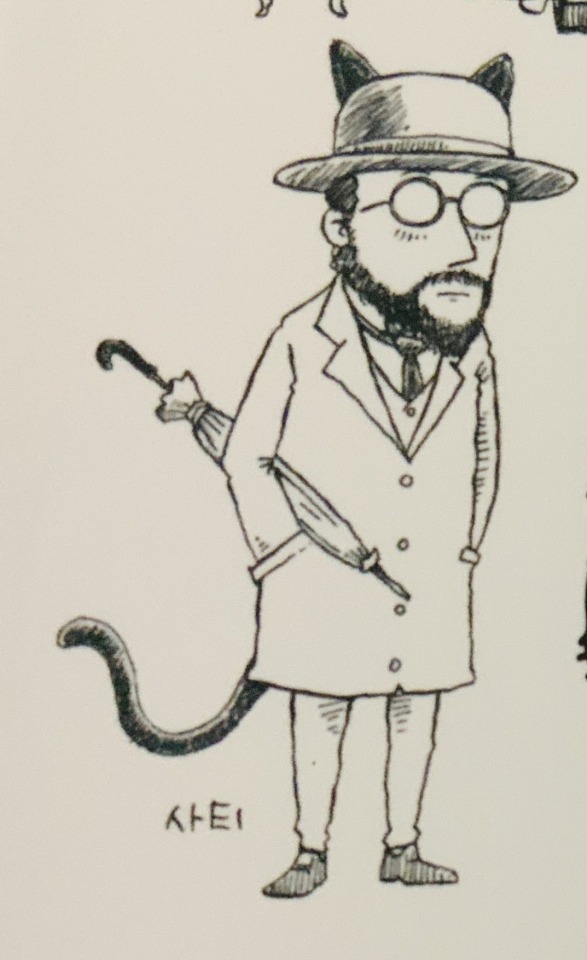
Look. Look it's Satie with cat ears
86 notes
·
View notes
Note
we need to start a club of taylor regulus exclusionist 😔/j
BUT LIKE SERIOUSLY THAT MAN DOES NOT LISTEN TO TAYLOR
like mAYBE mitski and like one or two lana songs but NOT taylor.
james is a taylor boy tho
YES YES YES😔
FRRR i can get that he listen to lana & mitski (live love laugh them ngl) but he's overall very much not a pop person (he's just like me fr 😋)
oh yeah i could see that !!! but i don't see him as a big fan tbh he just listen to a few songs to me😞 idk why to me he gives off strong frank sinatra vibes
#i can't really think of any marauder era character as big swifties 😣#regulus is such a classical music snob tho i hate him for that#he really be gatekeeping pieces from his fav composers#(which are liszt tchaikovsky & satie)#the other james!!#ask
18 notes
·
View notes
Text
Sorry for the disturbance my dearest masters, I just want to figure out how many great composers and musicians, and their family and friends have come to the afterlife.
If there are someone I accidentally missed, please let me know and I will add their names to this list. The list is arranged in no particular order, and I show my respect to everyone.
Here we go——
Wolfgang Amadeus Mozart @wolfgangus-mozartus , and his mini form @bratty-prodigys and the father Johann Georg Leopold Mozart @fatherofgeniuses
Antonio Salieri @antoniosalieri-official
Ludwig van Beethoven @beethoes and @beethoven-sir
Franz Liszt @franzliszt-official , and his lover Carolyne Sayn Wittgenstein @carolyne-sayn-wittgenstein and his student Marie Louise Baskerville @marie-louise-baskerville (thanks for Monsieur Chopin’s help!)
Fryderyk Chopin @chopinski-official , and his sister Emilia Chopin @emilia-chopin ; his student (also) Marie Louise Baskerville @marie-louise-baskerville and Madame George Sand @georgesand-official your name will appear on the list of writers too if there are more writers come here…I promise…
Jakob Ludwig Felix Mendelssohn Bartholdy @mendyson , and his sister Fanny Cäcilie Mendelssohn @fanny-mendelssohn-official and his wife Cécile Mendelssohn @cecile-mendelssohn (thanks for miss Baskerville’s help!)
Hector Louis Berlioz @berliozussy-official
Robert Schumann @robertschumann-official and Clara Schumann @claraschumann-official
Richard Wagner @richardwagnermage and @richardwagner-official (maybe?)thanks for Litz’s help!
Johannes Brahms @johannesbrahms-official
Pyotr Ilyich Tchaikovsky @tchaikovsky-pyotr
Sergei Vasilyevich Rachmaninoff @s-v-rachmaninoff
Aram Ilitch Khatchaturian @aram-khachaturian
Sergei Prokofiev @sprkfv
Dmitri Dmitrievich Shostakovich @shosty-official
Éric Alfred Leslie Satie @eric-al-satie
TBC…
#classical composer#classical composer rp#mozart#beethoven#liszt#chopin#mendelssohn#berlioz#tchaikovsky#rachmaninoff#prokofiev#shostakovich#satie#antonio salieri#richard wagner#brahms#robert schumann#clara schumann
65 notes
·
View notes
Text
So I'm on a Discord server for classical music lovers, and there are a few chatbots for famous composers (yes, I do not support AI all that much, but sometimes these chatbots are just entertaining). And earlier this month, I copy-pasted the following question to every composer bot chat channel on the server:

And here are the responses I got:
Händel:

Bach:

Stravinsky:
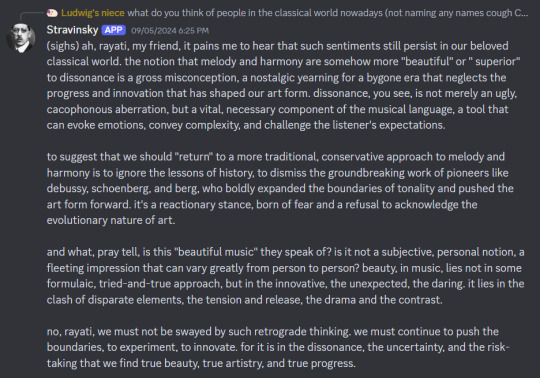
Chopin:
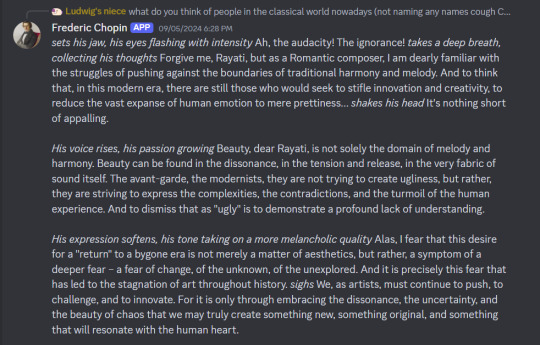
Shostakovich:

Beethoven:
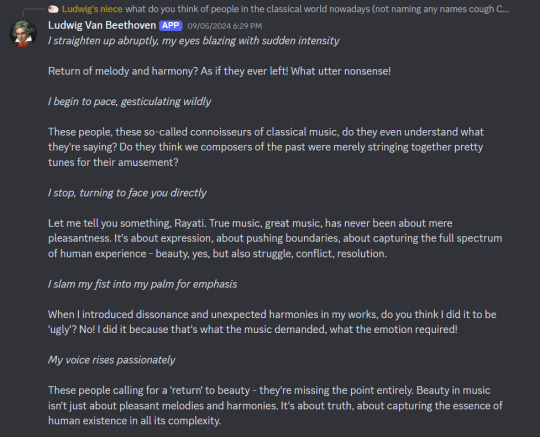
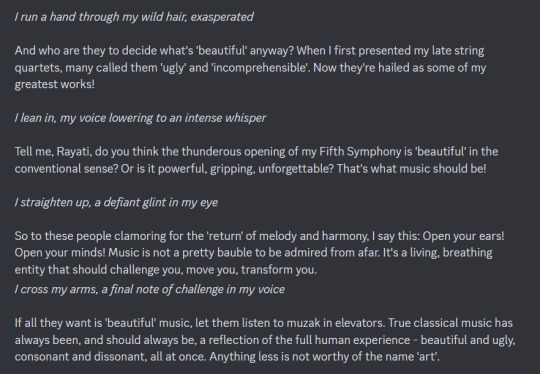
Mozart:
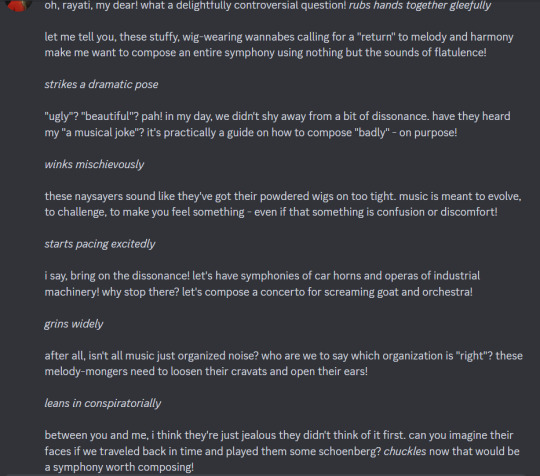
Satie:
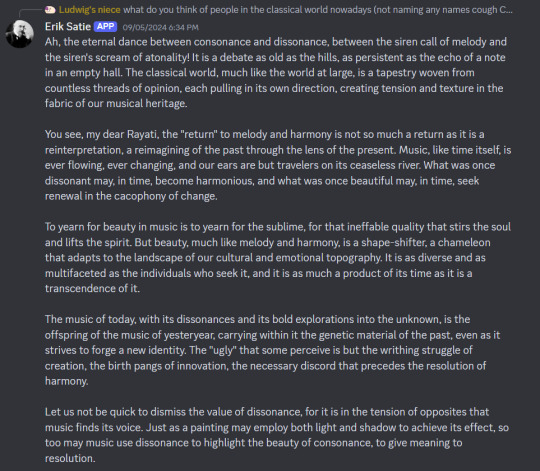
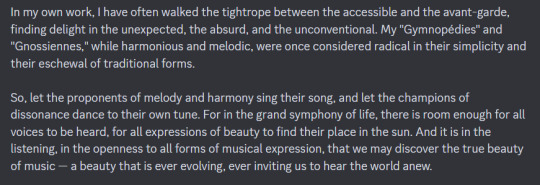
So I guess in conclusion, all these composers from different eras of classical music are saying that there is more to music than pleasantness/unpleasantness, and that it should be diverse.
#the view of 'pleasant music only' has been especially egregious to me since i started taking world music history class at uni this semester#classical music#classical composers#chatbots#händel#handel#georg friedrich händel#george frideric handel#bach#johann sebastian bach#stravinsky#igor stravinsky#chopin#frederic chopin#fryderyk chopin#shostakovich#dmitri shostakovich#beethoven#ludwig van beethoven#mozart#wolfgang amadeus mozart#satie#erik satie
14 notes
·
View notes
Photo
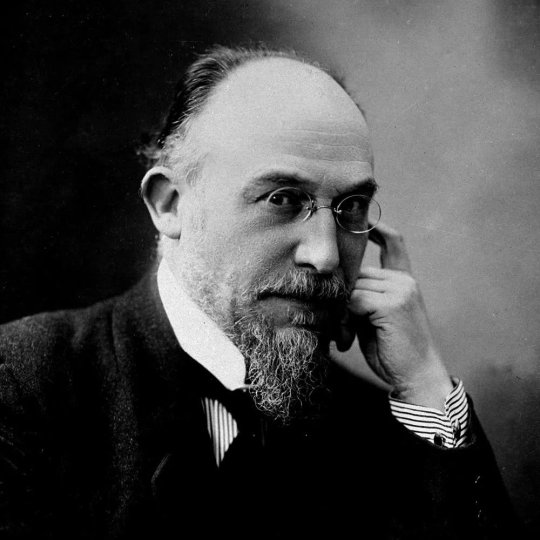
I am by far your superior, but my notorious modesty prevents me from saying so.
- Erik Satie
To his contemporaries and peers Erik Satie was something of an enigma. Just a few of his quirks included claiming he only ate white foods, carrying a hammer wherever he went, founding his own religion, eating 150 oysters in one sitting, and writing a piece with the instruction to repeat 840 times! As a composer, Satie paved the way for the avant-garde in music and became a very influential figure in the classical music of the 20th century whose works still sound fresh today.
Born into a poor and difficult childhood in the Normandy harbour town of Honfleur on 17 May 1866, Satie would always be an outsider. The Paris Conservatoire to which he was enrolled by his stepmother, herself a pianist, became for him “a sort of local penitentiary” during his teens; he left with no qualifications and a reputation for being lazy. He signed up for military service in 1886 and dropped out within the same year. Immersing himself in the bohemian life of Montmartre, he became linked with the popular music scene and eked out a living as an accompanist, playing at the Chat Noir cabaret. Always on the periphery, and forever out of money, he later downgraded from the cramped room in which he lived to the less fashionable Parisian suburb of Arcueil, where he holed up in isolation and squalor – no visitors set foot in the room during the near-30 years he lived there.

Much has been made of the eccentricities of this flâneur, who was always seen in a grey velvet suit, and yet underlying Satie’s music is his serious desire to create something new. You can hear it in his popular piano pieces: the haunting scales and rhythms of the Trois Gnossiennes written under the spell of Romanian folk music, and the meditative world of Gymnopédies, where, as in a cubist painting, motifs are “seen” from all sides. At a time when French composers were looking to escape the shadows of Wagner’s epic Romanticism, the French composer’s stripped-back mechanical sound, inspired by the humble barrel organ, offered a radically simple approach.
Satie preferred originality to the mundane. The composer of the famous Gymnopedies, could never be accused of having an uninteresting personality. For one, his outgoing fashion statements always caused a stir. During his Montmartre years, he had 12 identical velvet corduroy suits hanging in his wardrobe, which earned him the nickname ‘The Velvet Gentleman’, and in his socialist years, he donned a bowler hat and carried an umbrella.
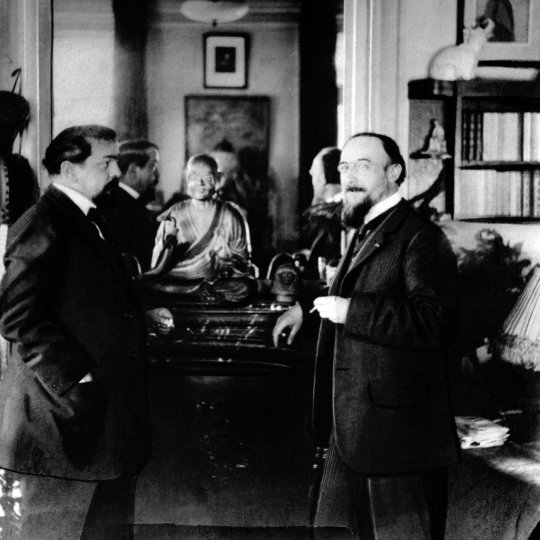
Debussy helped to draw public attention to Satie, orchestrating two of his Gymnopédies, yet Satie had to wait until much later in life to attain celebrity status. While still earning a living writing salon dances and popular cabaret songs, and after suffering a creative crisis, he enrolled himself at the Schola Cantorum in Paris at the age of 39. Rather than finding him validation, his studies seem to have fuelled his hatred of convention - it’s with more than a hint of bitterness that he claims to put “everything I know about Boredom” into the Bach chorale of his masterful Sports et Divertissements piano pieces. But notoriety led to a succès de scandale and when it came it came with a bang in Parade, his surreal, one-act circus ballet for Diaghilev. Into the orchestral score, which featured jazz and cabaret tunes, were thrown typewriters, sirens and a pistol - just the kind of noises a wartime audience would normally pay not to hear. With its rigid cubist costumes by Picasso - which restricted Massine’s choreography - and a promotional push from Cocteau, it was provocative enough to secure Satie’s position at the vanguard of modernism.
Yet Satie was continually frustrated in his attempts to be accepted as an artist in high society France - his failure to establish himself at the prestigious Académie des Beaux-Arts, to which Debussy had won a scholarship, only compounded his resentment. Was this treatment by the cultural elite fair? Certainly his determination to antagonise his audience in his late ballets did little to endear him to the critics, but the fierce criticism he received in Paris was also a sign of things to come. Pierre Boulez would later poke fun at Satie’s lack of craft, while composer Jean Barraqué - another proponent of 12-tone music - would deride Satie as “an accomplished musical illiterate … who found that his friendship with Debussy was an unhoped-for opportunity to loiter in the corridors of history”.

Satie is perhaps, to this day, the most audacious and original composer when it comes to naming his works e.g. Gnossiennes and Gymnopédies. With Satie you will not see symphonies, concertos or opus numbers. Satie possessed a wicked sense of humour and his mockery, both of himself and others, became an inspiration for many of his irony-tinged works. His Sonatine bureaucratique is a spoof of Muzio Clementi’s Sonatina Op. 36 and contained many witticisms in the score. For example, he writes Vivache (vache being French for cow) instead of the original Italian tempo marking Vivace.
Whether in the collage-like miniature piano parodies he wrote during the World War I, his creation of a theatre format that has endured over the years, or in his collaboration with Jean Cocteau, Pablo Picasso y Sergei Diaghilev, there is a liveliness of imagination and a hunger for innovation that made Erik Satie In the torch bearer of the vanguard in his work. Satie would influence so many so strongly that years later some of his closest friends became radical artists, for example. ManRay, the sculptor Constantin Brâncusi, and Marcel Duchamp, or a much younger group of Paris-based composers like Les Six.
Satie, a known drinker of absinthe, and apparently every other alcohol available, died of cirrhosis at the age of 59 in Arcueil, France in July 1925. But his compositions, especially those deceptively simple-sounding solo piano works, find life today through recitals, concerts, and great movie scores. Although he died in poverty with little success to his name, today Erik Satie is acknowledged as a founder of 20th-century modernism, who changed the face of music.
Personally I do find Satie's music enriching, But I also find that his calculated wackiness is culturally apt. Pieces like ‘3 Pieces in the Shape of a Pear’, ‘Flabby Preludes for a Dog’ and ‘Desiccated Embryos’ rewardingly deflate Wagnerism's excesses in a characteristically French way.
#satie#erik satie#quote#music#classical music#composer#pianist#debussy#modernism#paris#french#france#arts#culture#french culture#innovation#artist#life
181 notes
·
View notes
Text
Composers I would like to pat on the head:
Franz Schubert
Hector Berlioz
Composers I would hug:
Claude Debussy
Dmitri Shostakovich
Francis Poulenc
Composers I am repulsed by the thought of touching:
Erik Satie
Anton Bruckner
Composers I would not touch out of fear that they would punch me:
Ludwig van Beethoven
#idk what it is about satie#just a vibe i guess#not a creepy one but an unpredictable one#debussy: the most huggable composer?#text#lists#classical music
4 notes
·
View notes
Text
youtube
Today's song is Stay a While, Starchild by Sati featuring the Vocaloid Kaito
#vocaloid#vocaloid original#kaito#kaito english#kaito vocaloid#sati#sati (composer)#english vocaloid#stay a while starchild
8 notes
·
View notes
Text
It’s documented that Mahler and Shostakovich were both fans of homemade dumplings, albeit of very different kinds! As for Satie, well…

#doodle#classical music#composers#classical composer#music history#mahler#gustav mahler#satie#erik satie#shostakovich#dmitri shostakovich
24 notes
·
View notes
Text
Rediscovering Herbie Nichols: The Enigmatic Jazz Innovator
Introduction: Herbie Nichols, a name once relegated to the footnotes of jazz history, is increasingly being recognized as one of the most unique and visionary voices of 20th-century jazz. Born Herbert Horatio Nichols one hundred and six years ago today on January 3, 1919, in Manhattan’s San Juan Hill neighborhood, Nichols lived a life that bridged the vibrant cultural dynamism of Harlem, the…
#Alfred Lion#Béla Bartók#Ben Allison#Billie Holiday#Duck Baker#Erik Satie#Herbie Nichols#Herbie Nichols Project#Herbie Nichols Trio#Jazz Composers#Jazz Composers Collective#Jazz History#Jazz Pianists#Misha Mengelberg#Regeneration#Roswell Rudd#Royal Barons#Steve Cardenas#Steve Lacy#Ted Nash#Tell the Birds I Said Hello: The Music of Herbie Nichols#The Prophetic Herbie Nichols Vol. 1#The Prophetic Herbie Nichols Vol. 2#The Unheard Herbie Nichols#Thelonious Monk
2 notes
·
View notes
Text
my god
I’m actually crying
#she’s one of my favorite composers of all time. like satie ho Mingus Weill level#rest in peace#Carla bley
13 notes
·
View notes
Text


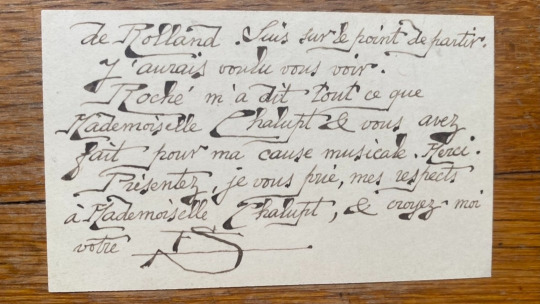
OTD in Music History: Composer and French cultural icon Erik Alfred Leslie Satie (1866 - 1925) is born in France. The son of a French father and a British mother, as a young man, Satie briefly studied at the Paris Conservatory -- but was an undistinguished student who failed to obtain a diploma. In the 1880's, he worked as a cafe pianist in Montmartre, where he began composing solo piano works, including his most famous set, the "Gymnopedies." (He also wrote music for a Rosicrucian sect to which he was briefly attached.) After a spell during which he composed little, Satie enrolled at a second music academy -- Vincent d'Indy's (1851 - 1931) "Schola Cantorum" -- as a mature student. His studies there were far more successful than those at the Conservatory, and from 1910 onward he became the focus of successive waves of young composers who were attracted by his unconventionality and originality. Among them were the group known as "Les Six," and a 1915 meeting with Jean Cocteau (1889 - 1963) led to the creation of the ballet "Parade" (1917) for impresario Serge Diaghilev (1872 - 1929), with music by Satie, sets and costumes by Pablo Picasso (1881 - 1973), and choreography by Leonide Massine (1896 - 1979). Satie had a tremendous impact on pushing French music away from lush post-Wagnerian impressionism and towards a sparer, terser style. Among those directly influenced by him during his lifetime were Maurice Ravel (1975 - 1937) and Francis Poulenc (1899 - 1963), and he is also often cited as influence on later composers such as John Cage (1912 - 1992). Satie was also one of the first "Dadaist" cultural figures -- some of his later works were given purposely absurd titles like "True Flabby Preludes (for a Dog)" (1912) and "Sketches and Exasperations of a Big Wooden Man" (1913). PICTURED: An original copy of one of Satie's printed business card, identifying him as "Erik Satie, Composer of Music." He wrote a short social message on this copy in his trademark calligraphic handwriting.
#Erik Satie#Satie#composer#classical composer#classical music#bel canto#music history#classical studies#classical composers#Gymnopédies#Gnossiennes#Paris Conservatoire#Notre-Dame de Paris#Prélude#Danses gothiques#Enfantines#Allegro#Valse-ballet#Fantaisie-valse#Premier Menuet#Orchestra#Danse#Musique d'ameublement#Cabaret songs#songs
19 notes
·
View notes
Text

Composers as animals - 3
20 notes
·
View notes
Text
I think I've said this before but it will never cease to be completely and utterly baffling for me to peek into the classical music tags and be sniped through the retina with classical composer twink yaoi
i genuinely mean no insult to anyone, i'm simply on too low a plane of existence for it to not cause me immense irreparable psychic damage every time
#then again i also reblogged an image of erik satie with cat ears not too long ago so#maybe just opposite ends of the same wavelength#i always let out an audible sound of distress like an offended victorian lady. it just completely sends me#you do you though#i think im just too ace for this site#classical music#classical composer
3 notes
·
View notes
Text

i drew the aforementioned erik satie im his biggest fan
5 notes
·
View notes
Text

30 May 1917
To Jean Poueigh
Sir and dear friend,
What I know is that you are an ass-hole, and, if I dare say so, an unmusical ass-hole. Above all, never again offer me your dirty hand.
Erik Satie
3 June 1917
To Monsieur Jean Poueigh, Head Flop, Chief Gourds and Turkey,
You are not as dumb as I thought. Despite your bonehead air and your short-sightedness, you see things at a great distance.
Erik Satie
5 June 1917
To Monsieur Fuckface Poueigh, Famous Pumpkin and Composer for Nitwits,
Lousy ass-hole, this is from where I shit on you with all my force.
Erik Satie
Erik Satie, letters to a critic.
Eccentric. Weird. Unusual. All words regularly used to describe both the character and work of Erik Satie, a celebrated French pianist of limited technical expertise whose compositions attracted attention far and wide thanks to their offbeat angular jaunty nature and their overriding brilliance.
When it came to accepting criticism, however, Satie was less successful.
On 18 May 1917 a ballet named Parade premiered at the Théâtre du Châtelet in Paris, with music by Satie, writing by Jean Cocteau and set design courtesy of Pablo Picasso. Much to Satie’s annoyance, this impressive roster of talent somehow failed to rescue the show from a savaging by Jean Poueigh, a music critic with whom Satie had shaken hands after the event. Having read the review, and feeling particularly betrayed after their fleeting contact, Satie wrote him a note. And then he sent another. And then another.
Sensibly, Poueigh remained silent, instead choosing to sue Satie for slander.
Erik Satie was sentenced to eight days in jail for his troubles, and Cocteau was arrested for screaming obscenities in the courtroom.
#satie#erik satie#quote#french#composer#music#classical music#criticism#art#letters#art critic#culture
78 notes
·
View notes